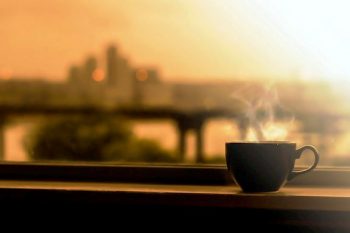A Good Morning Routine in Chinese Posted by Ayana on Oct 2, 2017 in Vocabulary
A morning routine is very important早晨起床后的日常习惯是很重要的 (zǎochén qǐchuáng hòu de rìcháng xíguàn shì hěn zhòngyào de). Your morning habits can affect your entire day. Adopting healthy customs can improve your mood for the whole day. And these customs don’t require much time or effort, like eating a nutritious breakfast. Let’s do all this in Chinese!
起床 (qǐ chuáng) to get up
I am a morning person 我是喜欢早起的人(wǒ shì xǐhuān zǎoqǐ de rén). For me it feels great to wake up early 早起 (zǎoqǐ) after a good night sleep and start the day full of energy. There are books and articles that claim successful people are morning people成功人士都喜欢早起(chénggōng rénshì dōu xǐhuān zǎoqǐ). Jack Dorsey, for example, the co-founder and CEO of Twitter, wakes up at 5 every morning.. Getting up early provides him enough time for sport and meditation before diving into work. But every rule has an exception. Mark Zuckerberg, the co-founder of Facebook, on the other hand, admitted that he was never 喜欢早起的人until his first child was born.
我是喜欢早起的人,我每天都早起。
Wǒ shì xǐhuān zǎoqǐ de rén, wǒ měitiān dōu zǎoqǐ.
I’m a morning person, I get up early every day.
昨天我很晚才睡觉,今天还早起。
Zuótiān wǒ hěn wǎn cái shuìjiào, jīntiān hái zǎoqǐ.
Yesterday I went to bed very late, and still got up early today.
杰克·多西每天都早上五点起床。
Jiékè•duō xī měitiān dōu zǎoshang wǔ diǎn qǐchuáng.
Jack Dorsey wakes up every morning at 5 a.m.
洗脸 (xǐ liǎn) to wash your face
The first thing I do after I wake up is wash my face 洗脸, and brush my teeth 刷牙 (shuā yá). Then I comb my hair梳头发 (shū tóu fǎ) with my cheap plastic comb 梳子 (shūzi). In China I saw many kinds of 梳子: wooden comb 木梳子 (mù shūzi ), horn comb 牛角梳 (niújiǎo shū) and even jade comb玉梳 (yù shū). These combs are more expensive than the plastic 梳子, but they reduce static, snag less hair and cause less hair breakage.
每天早上醒来后我先洗脸然后刷牙。
Měitiān zǎoshang xǐng lái hòu wǒ xiān xǐliǎn ránhòu shuāyá.
I wash my face first and then brush my teeth every morning after waking up.
我的梳子是在超市买的一个塑料梳子。
Wǒ de shūzi shì zài chāoshì mǎi de yīgè sùliào shūzi.
My comb is a plastic comb bought in the supermarket.
早操 (zǎocāo) morning exercises
The Chinese believe that morning exercises are good for your health. Compulsory 早操 are part of every Chinese kindergarten and school. For the grown-ups, the public park replaces the schoolyard, and every morning the parks fill with people exercising, dancing, doing tai chi, or just stretching. I wake up early every day, but I’m too lazy for早操every day.
早操对身体健康有好处。
Zǎocāo duì shēntǐ jiànkāng yǒu hǎochù.
Morning exercises are good for one’s health.
每个星期一和星期三我做早操。
Měi gè xīngqí yī hè xīngqísān wǒ zuò zǎocāo.
I do morning exercises every Monday and Wednesday morning.
早餐 (zǎocān) breakfast
Some believe that breakfast is the most important meal of the day. I agree with them, and that is why I never skip my 早餐 , which also called 早饭 (zǎofàn). Chinese breakfast can include: noodles 面条 (miàn tiáo), steamed stuffed bun包子 (bāo zi), Chinese crepe 煎饼 (jiān bǐng), and other delicious food. If I don’t have time for a proper 早餐, I’ll eat a light breakfast 早点 (zǎodiǎn). For example: steamed bun 馒头 (mán tou) or soybean milk 豆浆 (dòu jiāng). Note that in some areas in China 早点 doesn’t have the meaning of a small breakfast, but means the same as 早餐 does.
一天中早餐是最重要的。
Yītiān zhōng zǎocān shì zuì zhòngyào de.
Breakfast is the most important meal of the day.
不过,有的人觉得早餐可有可无。
Bùguò, yǒu de rén juédé zǎocān kě yǒu kě wú.
And yet, some people think breakfast is dispensable.
很多人因为起床晚了没时间吃早餐。
Hěnduō rén yīnwèi qǐchuáng wǎnle méi shíjiān chī zǎocān.
Many people get up late and don’t have time to eat breakfast.
早安 (zǎo ān) good morning
早上好 (zǎoshang hǎo) and 早安 are two ways to greet people at the beginning of the day. If you want to make it shorter you can simply say 早, for example: 你早! (nǐ zǎo), 先生早! (xiānshēng zǎo).
Text vocabulary
起床 qǐ chuáng = to get up
早起 zǎoqǐ = to get up early
醒来 xǐng lái = to wake up
洗脸 xǐ liǎn = to wash one’s face
刷牙 shuā yá = to brush one’s teeth
梳头发 shū tóu fǎ = to comb one’s hair
梳子 shūzi = a comb
早操 zǎocāo = morning exercises
早餐 zǎocān = breakfast
早饭 zǎofàn = breakfast
早安 zǎo ān = good morning
早上好 zǎoshang hǎo = good morning
好好学习 – 天天向上

Build vocabulary, practice pronunciation, and more with Transparent Language Online. Available anytime, anywhere, on any device.





Leave a comment: